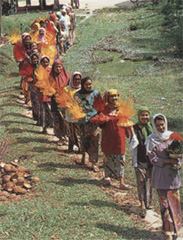|
|
|
The Land and Its People
|
Social Values
Buddhist teachings are at the root
of the typical Thai villager's sincere
consideration for omers, embodied in
the virtue known as namchai, "water of
the heart," a concept encompassing
spontaneous warmth and compassion
that allows families to make anonymous
sacrifices for friends and to extend
hospitality to strangers. For example, a
stranger entering a village will rarely be
seen as an intruder and a subject for
suspicion and distrust. Much more
likely, the villagers will have the
namchai to take him in, feed him, offer
him a bed in one of their homes, and
generally treat him as a friend. Buddhism
also lies behind such common expressions as mai pen rai ("never mind. it
doesn't matter") when something unfortunate happens, reflecting the feeling
thai one must gracefully submit to
external forces beyond one's control,
such as the effects of past karma.
 |
Thais believe in social harmony |
Although highly individualistic
and resisting regimentation. Thais
nevertheless believe that inner freedom
is best preserved in an emotionally and
physically stable environment. Therefore,
they believe that social harmony is best
maintained by avoiding any unnecessary
friction in their contacts with others.
From this has grown the strong Thai
feeling of krengchai. which means an
extreme reluctance to impose on anyone
or disturb his personal equilibrium by
direct criticism, challenge, or confrontation,
In general, people will do their utmost to
avoid personal conflict.
Outward expressions of anger are
also regarded as dangerous to social
harmony and as being obvious signs of
ignorance and immaturity. Indeed, during
normal social intercourse, strong public
displays of emotion are rare, sometimes
leading to misunderstanding among
outsiders from other cultures.
Within such a behavioural framework. Thais share very definite views on
what constitutes friendship and enjoyment. Sincere friendship among Thais
is extremely intense; the language is rich
in expressions which reflect the degree
of involvement and willing self-sacrifice.
Such relationships are found particularely
among men. A phuan tai, literally "death friend," is a companion for whom it
would be an honour to die. Should a
friend be involved in difficulties, his
friend feels an obligation to help him,
regardless of the danger to himself,
because tong chuai phuan "one must
help one's friends." This requirement is
a sensitive point of honour and explains
many circumstances that often baffle
outsiders. Displays of dismay, despair.
displeasure, disapproval, or enthusiasm
are frowned upon. Accordingly, a person
who is, or appears to be, serenely
indifferent (choei choei} is respected for
having what is considered an important virtue.
On the level of acquaintanceship,
politeness predominates. When greeting
people. Thais will usually show their
concern for others' health by remarking
how "thin" or "fat" he or she has become,
The remark is intended as a gesture of friendship.
| | |
|
|